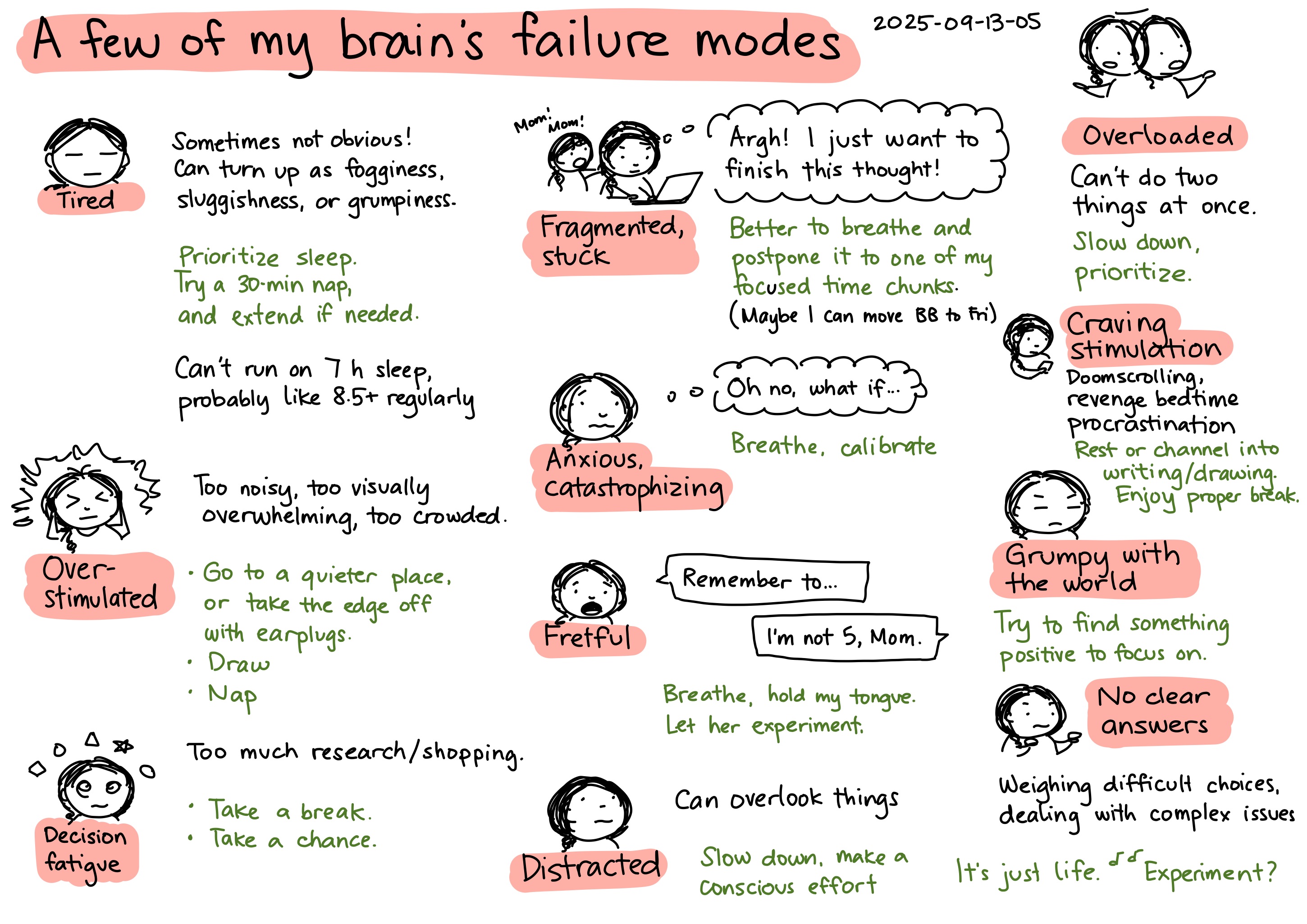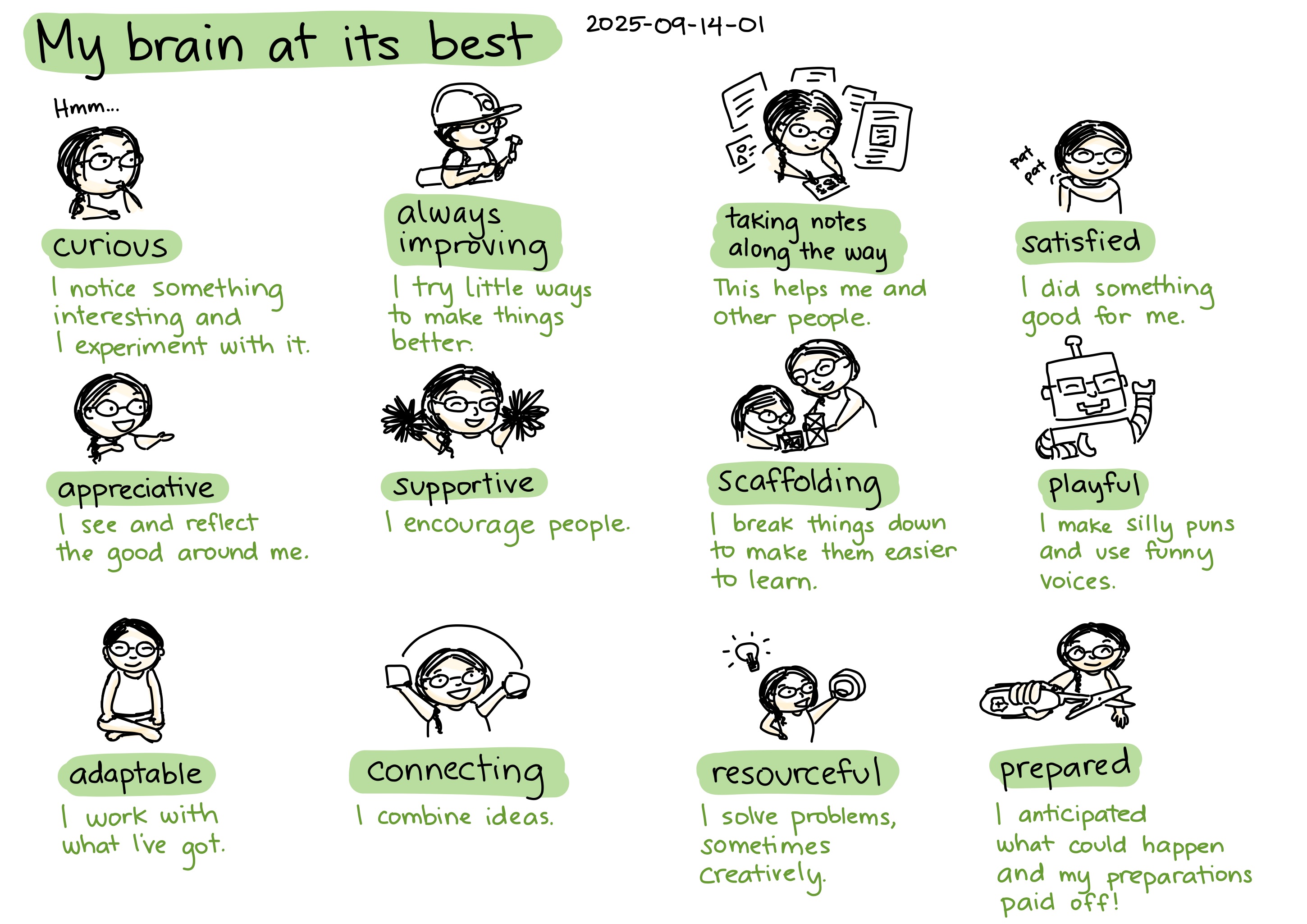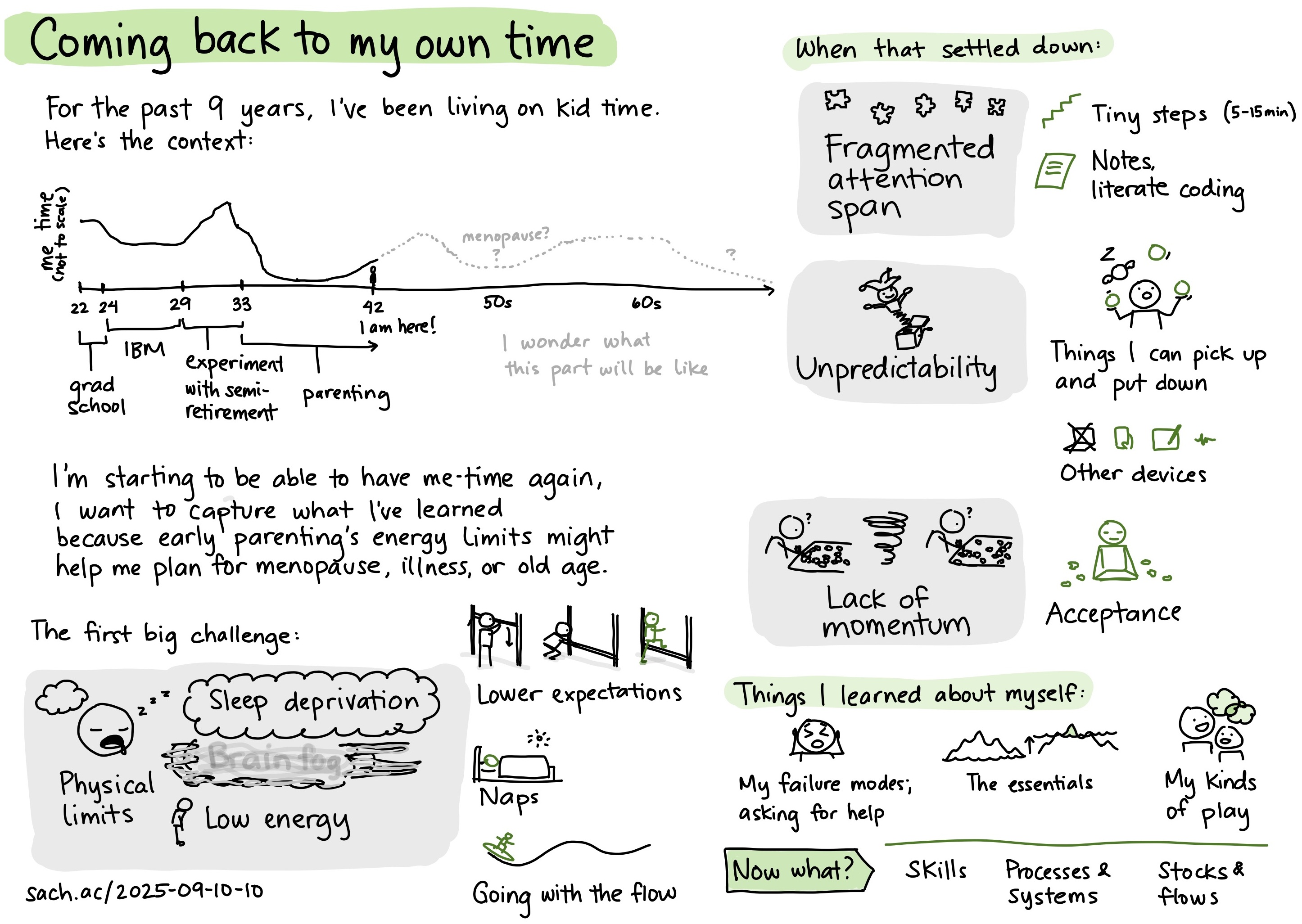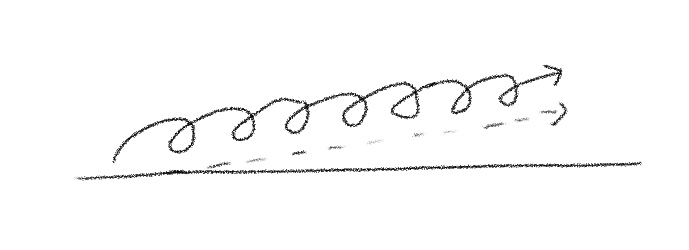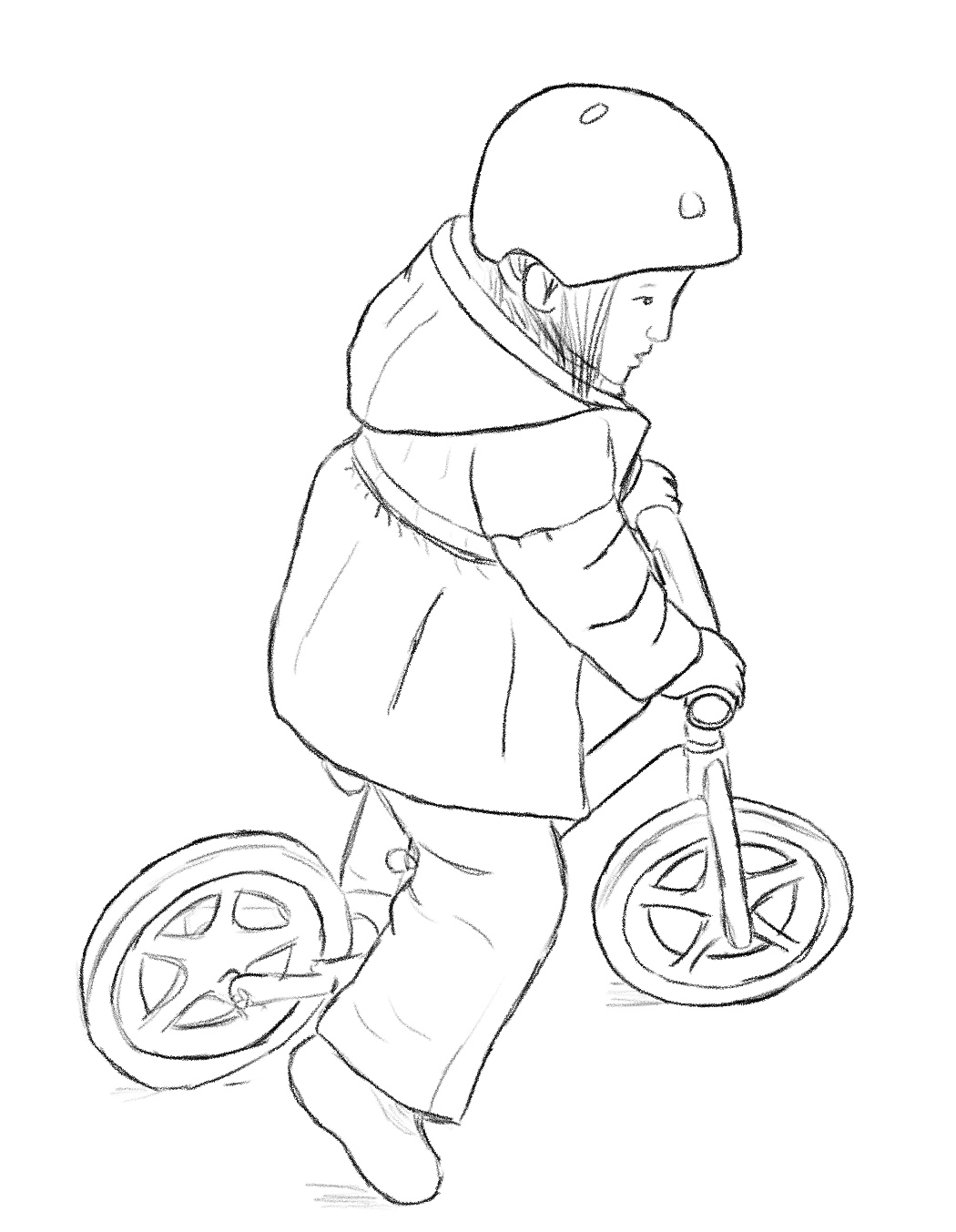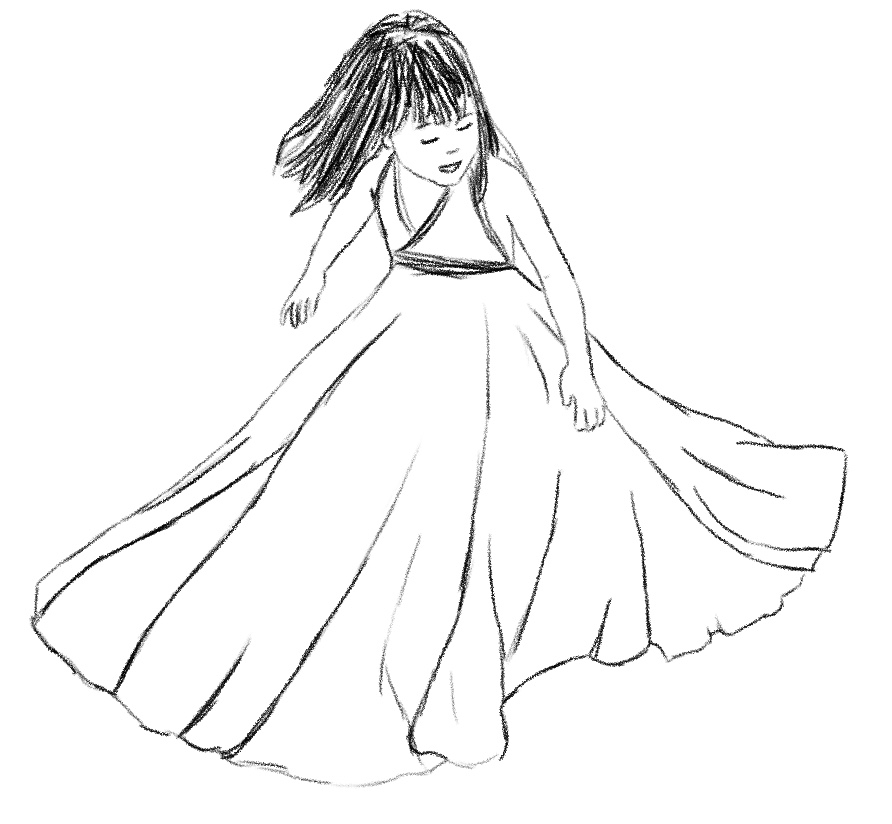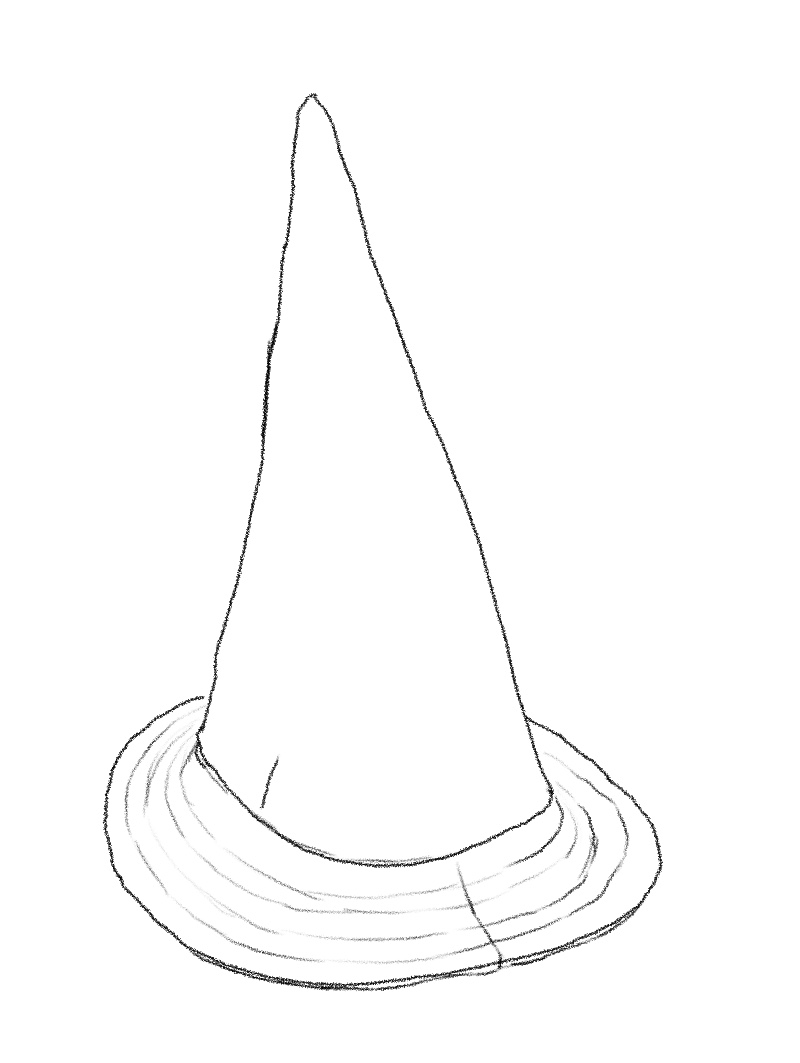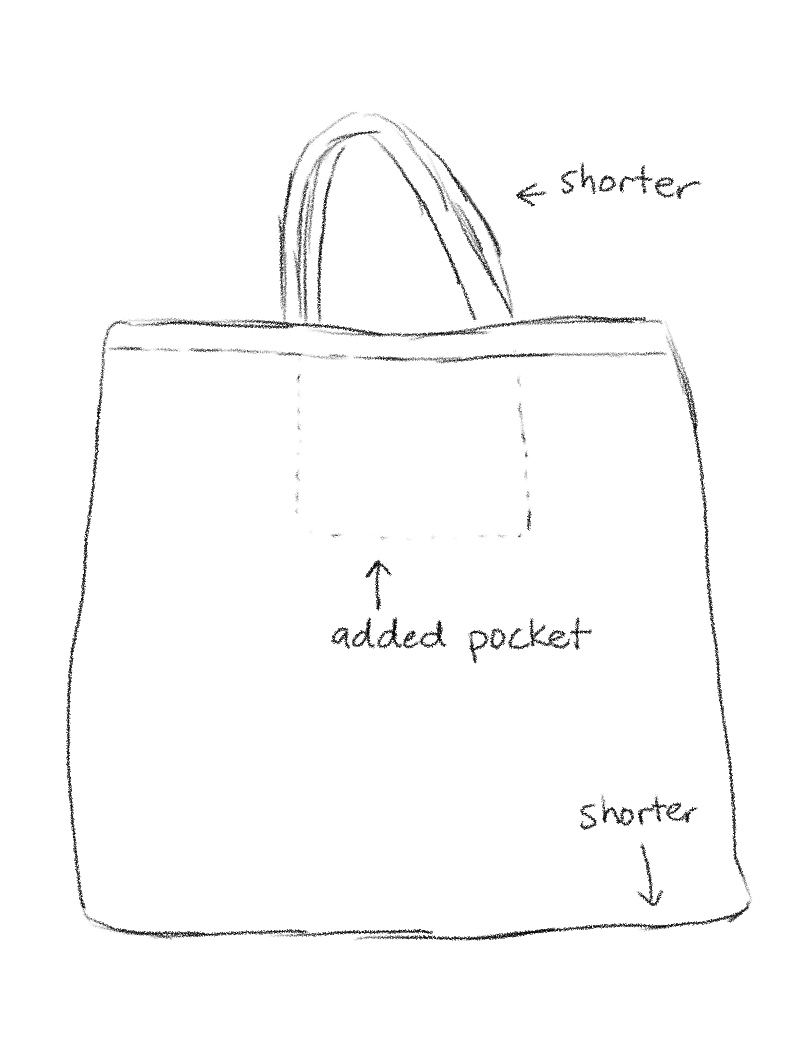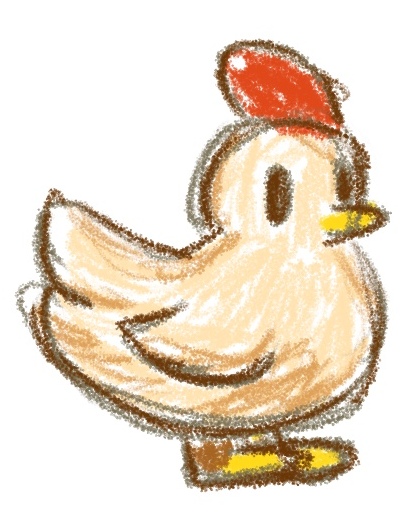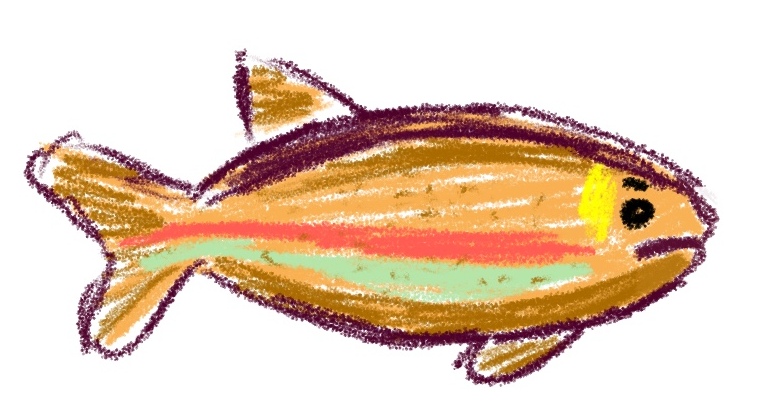Slowing down and figuring out my anxiety
| parenting, life, reflectionI am going through a lot. It is not much compared to what other people are going through. But it is more than what I usually go through, so it's a good idea to slow down and give myself space to learn how to handle it.
Part of handling times like these is touching base with what I know. I know that to be human is to have challenging times, so I don't find this surprising. I know that it is objectively difficult and that other people have a hard time with situations like this, so it's not a personal failure and there are no easy solutions. I know that it is temporary and that things will eventually settle into a new normal. I know there will be many such transitions ahead, and I'm getting used to the process of leaving old normals behind and focusing on the next step.
I know the way my brain tends to behave when it's overloaded. My attention hiccups. I hang up my keys on a coat hook instead of the one near the door. My fingers stutter on the piano. I can't multitask. When that starts to get in my way, it's a good reminder to get more sleep and do fewer things. There are very few firm commitments in my life, and I appreciate the flexibility that my past self planned. There's room to wobble1 without bringing everything crashing down.
Text from sketch
A few of my brain's failure modes 2025-09-13-05
- Tired
- Sometimes not obvious! Can turn up as fogginess, sluggishness, or grumpiness.
- Prioritize sleep.
- Try a 30-min nap, and extend if needed.
- Can't run on 7h sleep, probably like 8.5+ regularly
- Over-stimulated
- Too noisy, too visually overwhelming, too crowded.
- Go to a quieter place, or take the edge off with earplugs.
- Draw
- Nap
- Decision fatigue
- Too much research/shopping.
- Take a break.
- Take a chance.
- Fragmented, stuck
- Argh! I just want to finish this thought!
- Better to breathe and postpone it to one of my focused time chunks. (Maybe I can move BB to Fri)
- Anxious, catastrophizing
- Oh no, what if…
- Breathe, calibrate
- Fretful
- "Remember to…" "I'm not 5, Mom."
- Breathe, hold my tongue.
- Let her experiment.
- Distracted
- Can overlook things
- Slow down, make a Conscious effort
- Overloaded
- Can't do two things at once.
- Slow down, prioritize.
- Craving stimulation
- Doomscrolling, revenge bedtime procrastination
- Rest or channel into writing/drawing.
- Enjoy proper break.
- Grumpy with the world
- Try to find something positive to focus on.
- No clear answers
- Weighing difficult choices, dealing with complex issues
- It's just life.
- Experiment?
I still notice my anxiety spike from time to time. My anxiety spills out as trying to either control too much, or (knowing that control is counterproductive) stepping back, possibly too much. It tends to latch onto A+'s schoolwork as the main thing it could possibly try to do something about. I feel partially responsible for helping her develop study skills and navigate the school system, but these things are mostly outside my control. It's good that it's not in my control. Then there's space for her to learn and grow, and for me to learn along with her.
Instead of trying to push futilely, it's better to step back, simplify, focus on getting myself sorted out, and build up from a solid base. Better to focus on connecting with rather than correcting A+, especially as she takes her own steps towards autonomy. It's okay for now to focus on making simple food, washing dishes,2 combing out the tangles in hair and in thoughts. Maintenance.
Here's the core I'm falling back to for now:
- Sleep
- A good walk outside, maybe 30-60 minutes
- Making an effort to eat a variety of healthy food, picking up ideas from DASH/Mediterranean3
- Piano, maybe 20 minutes: low stakes, not intense, just enough to notice when my mind wanders or my breathing stops, and the ever so gradual improvement from familiarity;
- A little bit of exercise: doesn't have to be much, just enough to begin the habit (15-25 minutes)
- Writing and drawing to untangle my thoughts
- A little bit of fun for myself. Might be tinkering with Emacs, might be drawing. Simple lines and colours are nice.
- Giving myself permission to tell other people "That's not one of my priorities for now." There's only so much I can focus on at a time.
- The reminder that other people have their experiments too. It's not about me; how freeing! It's good to not let my anxiety (just my ego's occasional fears of not doing enough, not being enough) engulf what properly belongs to other people. Learning is mostly A+'s experiment, and I can see this time as collecting data for a baseline. I'm happy to help her when she wants my help. Let's find out what can she do when I'm not pushing.
It's important to me to start from where I am and work with what I've got. Where else could I be, and what else could I use? Only here, only this, and it's enough.
I'm working on embracing my limits. It would be unproductively egotistic to think I have to do this all on my own. It helps to unload my brain into my Org Mode / Denote text files, my sketches, and my index cards so I can see beyond the single dimension of thought. Some days, even that is difficult. It's okay for my brain to not feel cooperative all the time. Some days are more blah than others, and it's hard to shape enough of the thought-fog4 into a post or a diary entry. There's no point in grumping at myself over it. It's okay for those days to be rest days, "take it easy" days, "there's room for this too" days. Goodness knows I've had slow months, slow years.5 (And if that's good for me, why not extend the same grace to A+? She'll figure things out when she's ready.)
I'm practising asking other people for help and letting them actually do so. I know A+ benefits from a wider world, and I'm glad she can chat with her aunts and cousins. I can slowly experiment with finding tutors and enrichment activities for A+, maybe even starting out with classes for me sometimes. She's been going to 1-on-1 gymnastics class for three weeks now. I love seeing how she's slowly learning to check in with her body and catch her breath so that she has more energy and can work on her flips safely. I love the way she gets up and tries again.
I wonder what other teachers and peers I can help A+ find. Next week, A+ will join a small-group art class so that she can have fun with art outside the requirements of school. A friend of hers is in the same extracurricular class, and maybe the fun will get her over the initial hump of practising fine motor skills and tolerating the frustrating gap between taste and skill.6 I want playfulness to be the core of her experience with art, not the pressure my anxiety feels about getting her art homework done. Knowing what my anxiety whispers, I can keep that from leaking out to her. The goal is not to get things done; the goal is simply to have the opportunity to find joy. Someday, when she reaches for a pencil or a brush, I want that feeling to come with warmth, a smile, curiosity: what will we encounter on the page today?
As she learns to read and write and think more deeply, I want the same for her: not the compliance of "have I checked the boxes,7" but "where can these thoughts take me?" Can I find her role models who can share that ineffable joy or opportunities where she can discover it for herself? Can it take root deep within her, something to touch as she goes through her own challenges, something that grows as she grows?
A wider world could help me, too. How wonderful it is to deal with something that so many people have gone through, are going through, even if there are no universal answers. I'm checking out workbooks from the library, and it might be interesting to experiment with seeing a therapist. I have mild anxiety according to the screening tools, but it might still be handy to pay for the accountability and structured exploration of my thoughts. Consulting an intern therapist might be a more affordable starting point that can help me figure out if I need more qualified care. We don't have medical benefits, so I want to be thoughtful about how I use resources, and I want to push myself to try out more help so that I know what that could be like instead of trying to handle everything on my own. Like the way A+'s gymnastics teacher thinks about the next skill that might be in her zone of proximal development8 (not too easy, not too hard), maybe someone else can help me map out what nearby betters could be and how I might get there.
Text from sketch
My brain at its best 2025-09-14-01
- curious: I notice something interesting and I experiment with it.
- always improving: I try little ways to make things better.
- taking notes along the way: This helps me and other people.
- satisfied: I did something good for me.
- appreciative: I see and reflect the good around me.
- supportive: I encourage people.
- scaffolding: I break things down to make them easier to learn.
- playful: I make silly puns and use funny voices.
- adaptable: I work with what I've got.
- connecting: I combine ideas.
- resourceful: I solve problems, sometimes creatively.
- prepared: I anticipated what could happen and my preparations paid off!
I know what it feels like when I can handle tough situations well: when I'm ready with a Band-aid or a hug, when I keep our basic needs sorted out so that we have a solid foundation to experiment on, when I get the hang of spelling new terms and organizing my hasty research into coherent understanding and ideas for things to try, when I can be warm and affectionate and appreciative and supportive.
I know what I hope A+ will feel: believed in, excited about her growing capabilities, supported when she wants help, open to things she might not know to ask about, able to straddle both wanting to be cuddled and wanting to be on her own. I want her to feel like she's the one figuring things out, so I want to get better at being a supporting character instead of letting my ego get in the way. (It's not a power struggle, it's not a moral judgment of me or of her, it's just life.)
When my anxiety wrings her hands, frets, whispers, worries that I'm not enough, I can think: ah, she is just trying to keep all of us safe, figure out how to make things better. I can use this imperative, this desire to try to help A+ live her best life. I know I don't want A+ to be driven by anxiety or controlled by conditional esteem.9 There'll be hard times for A+, like for everyone. I want her to be able to check in with herself, figure out what she needs, and feel her strength grow as she stretches. So I can work on getting better at that myself.
It's good to practise these things now, in this time that seems hard compared to the recent past but will seem easy compared to the future. Embrace the stress test while the stakes are low, so that I can reflexively use the skills when the stakes get higher, and so that A+ can take what she likes (kids are always watching) and use them as she figures out her own way.
Step by step. It's manageable. I can manage it. Could be interesting to see how we can make it slightly better. I'm not looking for answers. No one has them, and things change all the time. But the figuring out, that's the work of being human, isn't it?
This blog post was nudged by the October IndieWeb Carnival theme of ego.
Footnotes
Looking at landscapes; art and iteration and the quote from Ira Glass about the gap between taste and skill
More about motivation in Richard M. Ryan, Edward L. Deci, Intrinsic and Extrinsic Motivations: Classic Definitions and New Directions, Contemporary Educational Psychology, Volume 25, Issue 1, 2000, Pages 54-67, ISSN 0361-476X, https://doi.org/10.1006/ceps.1999.1020. (https://www.sciencedirect.com/science/article/pii/S0361476X99910202)
Brueckmann, M., Teuber, Z., Hollmann, J. et al. What if parental love is conditional …? Children’s self-esteem profiles and their relationship with parental conditional regard and self-kindness. BMC Psychol 11, 322 (2023). https://doi.org/10.1186/s40359-023-01380-3
Also: Assor A, Roth G, Deci EL. The emotional costs of parents' conditional regard: a self-determination theory analysis. J Pers. 2004 Feb;72(1):47-88. doi: 10.1111/j.0022-3506.2004.00256.x. PMID: 14686884.

